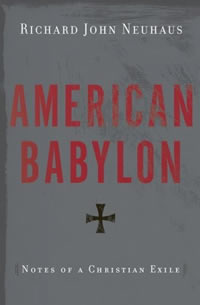Book Notes
 Richard John Neuhaus, American Babylon: Notes of a Christian Exile (New York: Basic Books, 2009), 270pp.
Richard John Neuhaus, American Babylon: Notes of a Christian Exile (New York: Basic Books, 2009), 270pp.
When Richard John Neuhaus (1936–2009) died of cancer, America lost one of its most public (and conservative) Christian intellectuals. The arc of his life had the look and feel of providence. Born in Canada, he became a naturalized American. A high school drop out, he advised George W. Bush. Ordained in the conservative Lutheran Church-Missouri Synod, in the sixties he joined forces with Daniel Berrigan to engage civil rights issues as a pastor to a Brooklyn congregation of blacks and Hispanics. After Roe v. Wade in 1973, he began to turn rightward. In 1990 he converted to Latin Rite Catholicism, was ordained a priest, and founded the Institute on Religion and Public Life, and its journal First Things, whose mission statement is "to advance a religiously informed public philosophy for the ordering of society."
You don't have to agree with Neuhaus's unapologetic neo-conservatism to appreciate the vigor with which he engaged Christian identity in the public square. Yes, he denied communion to Catholic politicians whom he considered insufficiently pro-life. He refers to Pope John Paul "The Great" (74, 209). He vigorously defended natural law theory ("those things that we cannot not know"). He warmed up to Lincoln's notion of America as the world's "last best hope" and defended democratic capitalism. But there he is engaging Peter Singer's advocacy of infanticide and eugenics, or Richard Rorty's "liberal ironism" (this chapter alone is worth the whole book). He wonders aloud about the "new atheism" and whether atheists can be good citizens. He circles back to Augustine and Aquinas, Jefferson and Madison, then forward to Alasdair MacIntyre, Derrida, Newman and the Niebuhrs.
Drawing upon the theme of exile in Babylon, Neuhaus considers how believers must be very much in the world but not a worldly people, and how we must, as Jeremiah told the ancient Jews, "seek the welfare of the city" where God has placed us, and "pray to the Lord on its behalf." His "controlling argument" is that Christians live in hope between the Already of the kingdom inaugurated and the Not Yet of its consummation, rejecting both despair and presumption.
Despite his conservative boosterism, Neuhaus advises a "disciplined skepticism" about politics. He admits that Christian hope is "painfully provisional," and that theodicy admits to no "intellectually satisfying answer." Christians of both the mainline left and the conservative right, he says, have contributed to "the political corruption of Christian faith and the religious corruption of authentic politics." Faithfulness in exile can take many different forms. And whether believers have tried co-existence or accommodation with Babylon, separation, subversion, or even insurrection, Neuhaus credits all with good faith efforts, even though none of us have found ultimately satisfying solutions. And so we live in faith for what we have not and cannot see.


